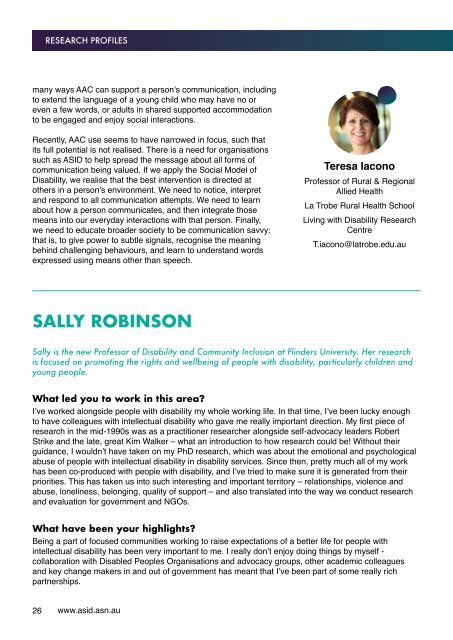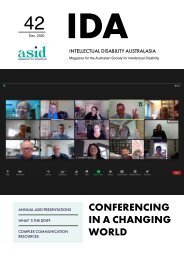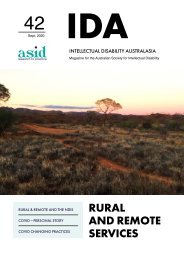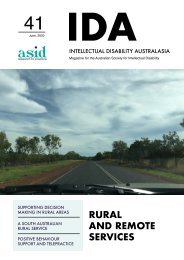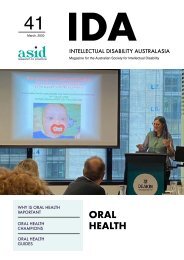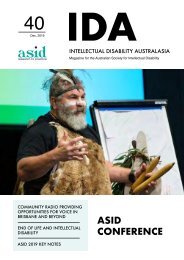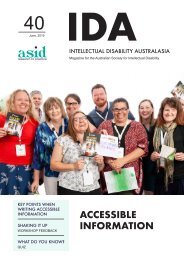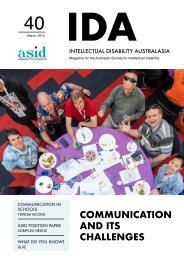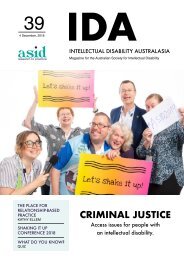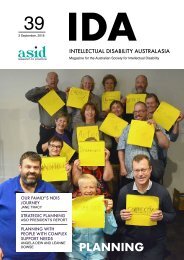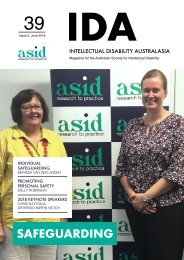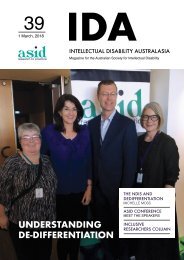IDA Magazine Vol 40 Iss 3 (Sep 2019)
- No tags were found...
You also want an ePaper? Increase the reach of your titles
YUMPU automatically turns print PDFs into web optimized ePapers that Google loves.
RESEARCH PROFILES<br />
many ways AAC can support a person’s communication, including<br />
to extend the language of a young child who may have no or<br />
even a few words, or adults in shared supported accommodation<br />
to be engaged and enjoy social interactions.<br />
Recently, AAC use seems to have narrowed in focus, such that<br />
its full potential is not realised. There is a need for organisations<br />
such as ASID to help spread the message about all forms of<br />
communication being valued. If we apply the Social Model of<br />
Disability, we realise that the best intervention is directed at<br />
others in a person’s environment. We need to notice, interpret<br />
and respond to all communication attempts. We need to learn<br />
about how a person communicates, and then integrate those<br />
means into our everyday interactions with that person. Finally,<br />
we need to educate broader society to be communication savvy:<br />
that is, to give power to subtle signals, recognise the meaning<br />
behind challenging behaviours, and learn to understand words<br />
expressed using means other than speech.<br />
Teresa Iacono<br />
Professor of Rural & Regional<br />
Allied Health<br />
La Trobe Rural Health School<br />
Living with Disability Research<br />
Centre<br />
T.iacono@latrobe.edu.au<br />
SALLY ROBINSON<br />
Sally is the new Professor of Disability and Community Inclusion at Flinders University. Her research<br />
is focused on promoting the rights and wellbeing of people with disability, particularly children and<br />
young people.<br />
What led you to work in this area?<br />
I’ve worked alongside people with disability my whole working life. In that time, I’ve been lucky enough<br />
to have colleagues with intellectual disability who gave me really important direction. My first piece of<br />
research in the mid-1990s was as a practitioner researcher alongside self-advocacy leaders Robert<br />
Strike and the late, great Kim Walker – what an introduction to how research could be! Without their<br />
guidance, I wouldn’t have taken on my PhD research, which was about the emotional and psychological<br />
abuse of people with intellectual disability in disability services. Since then, pretty much all of my work<br />
has been co-produced with people with disability, and I’ve tried to make sure it is generated from their<br />
priorities. This has taken us into such interesting and important territory – relationships, violence and<br />
abuse, loneliness, belonging, quality of support – and also translated into the way we conduct research<br />
and evaluation for government and NGOs.<br />
What have been your highlights?<br />
Being a part of focused communities working to raise expectations of a better life for people with<br />
intellectual disability has been very important to me. I really don’t enjoy doing things by myself -<br />
collaboration with Disabled Peoples Organisations and advocacy groups, other academic colleagues<br />
and key change makers in and out of government has meant that I’ve been part of some really rich<br />
partnerships.<br />
26 www.asid.asn.au


